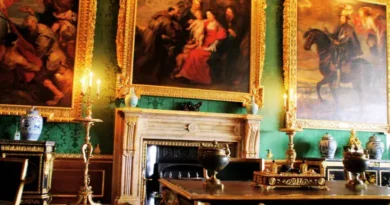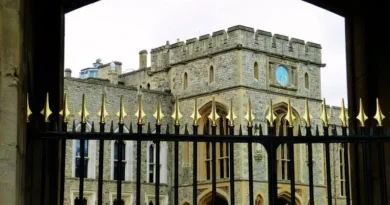Queen Mary’s Dollhouse at Windsor Castle
Key Takeaways
- Historical Significance
- Built between 1921 and 1924, Queen Mary’s Dollhouse is a miniature masterpiece showcasing Edwardian grandeur and craftsmanship.
- It was a gift to Queen Mary, reflecting the artistic and cultural values of the early 20th century.
- Concept and Creation
- Visionary Origin: Princess Marie Louise envisioned the Dollhouse to mirror the sophistication of a royal residence.
- Architectural Design: Sir Edwin Lutyens masterfully designed the structure, blending Edwardian elegance with modern innovations.
- Collaboration: Over 1,500 artisans contributed to its intricate details, including furniture, chinaware, and other miniatures.
- Completion: The project spanned four years, becoming a popular attraction at Windsor Castle.
- Architectural Features
- Exterior: A nine-foot-tall Edwardian townhouse replica with bay windows, a porticoed entrance, and a rooftop garden.
- Modern Amenities: Features electric lighting and running water, symbolising technological advancements.
- Interior Highlights
- Thematic Rooms: Each room represents Edwardian life, from regal suites to staff quarters, demonstrating a balance of luxury and functionality.
- Detailed Furnishings: Hand-carved woodwork, miniature books, chinaware, and everyday items add realism and charm.
- Notable Spaces
- Royal Chambers: The King’s and Queen’s suites showcase regal elegance, complete with en suite bathrooms.
- Family Rooms: A cheerful breakfast room and cosy nursery reflect family intimacy.
- Library: Houses over 350 miniature books, including contributions from prominent authors.
- Staff Areas: Functional spaces like the kitchen, pantry, and staff bedrooms highlight the essential roles of household workers.
- Gardens and Utility Spaces
- Outdoor Features: The landscaped garden and rooftop space provide tranquillity amidst the Dollhouse’s grandeur.
- Practical Additions: A garage and stables reflect Edwardian transportation needs.
- Cellar and Pantry: Behind-the-scenes spaces stocked with miniature provisions showcase Edwardian hospitality.
- Cultural and Artistic Value
- The Dollhouse contains miniature versions of artworks reflecting the royal family’s artistic interests and Edwardian aesthetics.
- Every detail, from furnishings to decorative elements, highlights the era’s craftsmanship.
- Public Access
- While Queen Mary’s Dollhouse is not open for daily viewing, it can be seen as part of a Windsor Castle tour. Booking is available online or via phone.
I. Introduction
Queen Mary’s Dollhouse, a remarkable feat of craftsmanship and artistry, is a testament to the creative spirit and enduring fascination with miniature worlds. Constructed between 1921 and 1924, this exquisite Dollhouse, commissioned as a gift for Queen Mary, consort of King George V, has captivated visitors for generations. Its intricate details, meticulous design, and historical significance have cemented its place as a cultural icon and a source of inspiration for artists, designers, and history enthusiasts alike.
II. Conception and Creation

A. Princess Marie Louise’s Vision: A Dollhouse for a Queen
Princess Marie Louise, a close confidante of Queen Mary and a keen admirer of miniature craftsmanship, conceived the idea of a dollhouse as a token of affection and admiration. Envisioning a miniature world that mirrored the grandeur of a royal residence, she embarked on this ambitious project, bringing together an exceptional team of artists, architects, and craftspeople to meticulously execute her vision.
B. Sir Edwin Lutyens’ Architectural Brilliance: Bringing the Dollhouse to Life
Sir Edwin Lutyens, a renowned architect celebrated for his expertise in scale and detail, played a pivotal role in bringing the Dollhouse to life. His meticulous attention to design and proportion enabled him to capture the essence of a grand London townhouse, seamlessly blending classical and Georgian architectural elements into the Dollhouse’s exterior. The brick and stone construction, adorned with bay windows, a porticoed entrance, and a rooftop garden, exudes the grandeur and elegance of Edwardian architecture.
C. A Gathering of Artisans: The Craftsmanship Behind the Dollhouse
Princess Marie Louise’s vision for the Dollhouse went beyond its architectural beauty. She wanted a miniature world filled with exquisite furnishings and objects that reflected the British upper-class lifestyle of the early 20th century. To make this a reality, she enlisted over 1,500 specialised craftspeople who brought meticulous attention to detail and scale to create objects like hand-carved wood panelling and delicate chinaware. This ensured that the Dollhouse mirrored the grandeur and elegance of real-life houses of that era.
D. From Concept to Completion: The Journey of Queen Mary’s Dollhouse
Queen Mary’s Dollhouse, a testament to the dedication and collaboration of renowned artists, architects, and craftspeople, took four years to complete, from its conception in 1921 to its unveiling in 1924. This miniature masterpiece quickly captivated visitors worldwide, brimming with intricate details and meticulous craftsmanship, becoming a popular attraction at Windsor Castle.
III. Architectural Features and Design

A. Exterior Grandeur: A Dollhouse Fit for a Queen
Inspired by the grand townhouses of London’s Edwardian era, Queen Mary’s Dollhouse stands nine feet tall, its imposing presence capturing the grandeur of its architectural origins. The façade showcases traditional and modern elements, featuring classic bay windows, a porticoed entrance, and a rooftop garden, all hallmarks of Edwardian design. Simultaneously, the architect, Sir Edwin Lutyens, incorporated modern touches such as steel-framed windows and electric lighting, reflecting the technological innovations of the time.
B. Interior Splendor: A Glimpse into Edwardian Living
Stepping inside Queen Mary’s Dollhouse, visitors are transported into a time capsule, immersing themselves in the elegance and grandeur of Edwardian living. The Dollhouse’s meticulously crafted interior reflects the layout and function of a real Edwardian home, with each room serving a specific purpose and providing a glimpse into the daily life of the upper class during that era.
The ground floor features a spacious entrance hall, a grand saloon for entertaining guests, a formal dining room, and a cosy library. The upper floors house the family’s private chambers, including the King’s and Queen’s suites, nurseries, and staff rooms. Each room is thoughtfully furnished with miniature replicas of real furniture, reflecting the styles and tastes of the Edwardian era.
Queen Mary’s Dollhouse was not just a showcase of Edwardian grandeur; it also incorporated several modern amenities considered cutting-edge at the time. These features seamlessly integrated into the Dollhouse’s design added a sense of realism. They reflected the technological advancements of the early 20th century. A remarkable feature is the Dollhouse’s electrical wiring system, which powers miniature lamps and other appliances throughout the house. Another notable modern amenity is the Dollhouse’s running water system, with miniature pipes carrying water from a rooftop tank to sinks, bathtubs, and toilets. Incorporating modern amenities enhances the Dollhouse’s realism and showcases the time’s innovative spirit.
C. Miniature Details: A Testament to Craftsmanship
Queen Mary’s Dollhouse is a testament to its creators’ exceptional craftsmanship and artistry. Its walls’ intricate details and miniature furnishings transport visitors to a time capsule of Edwardian elegance and grandeur.
Hand-carved woodwork and hand-painted murals adorn the Dollhouse’s interior, adding a touch of refinement and whimsy. The intricate patterns and designs meticulously rendered in miniature showcase the exceptional skill of the artisans who brought the Dollhouse to life.
Beyond the woodwork and murals, delicate chinaware, miniature books, and everyday items fill the Dollhouse’s rooms, providing a glimpse into the daily lives of the Edwardian upper class. The meticulously crafted chinaware, exquisitely detailed books, and nostalgic toys add a touch of realism and charm to the Dollhouse’s interior.
The presence of everyday objects, such as miniature toiletries, sewing kits, and kitchen utensils, further enhances the realism of the Dollhouse. These seemingly mundane items, crafted with precision and detail, remind visitors of the daily routines and tasks that filled the lives of the Edwardian upper class.
IV. Thematic Rooms and Furnishings

A. The King’s and Queen’s Suites: Reflecting Royal Majesty
Ascend the grand marble staircase of Queen Mary’s Dollhouse and enter the realm of royalty, where elegance and opulence reign supreme. The Royal Chambers on the second floor offer a glimpse into the lives of the King and Queen. Here, their refined tastes and the grandeur of their royal status are on display.
1. The King’s Suite
The King’s Suite embodies regality and sophistication. The grand four-poster bed, writing desk, and dressing room reflect the typical furnishings found in a king’s suite of an Edwardian-era residence
2. The Queen’s Suite
A sanctuary of feminine elegance, the Queen’s Suite contrasts with the King’s Suite’s bold masculinity. The four-poster bed, dressing table, and dressing room all align with what you’d expect in a queen’s suite of the Edwardian era
The Royal Chambers include en suite bathrooms, which were a standard feature in high-end Edwardian residences. While the specific details of the bathrooms are not documented, their presence reflects the luxurious nature of the Royal Chambers.
B. Luxurious Bathrooms and Dressing Rooms
Within the opulent Royal Chambers of Queen Mary’s Dollhouse, luxurious bathrooms and dressing rooms cater to the daily needs of royalty and household members. These meticulously designed rooms, equipped with wardrobes, mirrors, and grooming kits in the dressing rooms and modern amenities (although the exact features aren’t documented) in the bathrooms, reflect the grandeur of royal life during the early 20th century.
C. A Cozy Nursery and a Cheerful Breakfast Room
Beyond the regal grandeur of the Royal Chambers, Queen Mary’s Dollhouse unveils the warmth and intimacy of family life. The Nursery, a haven of innocence and joy, is filled with toys, games, and childhood treasures, evoking a sense of nostalgia and delight. Miniature rocking horses, teddy bears, and a dollhouse within the Dollhouse hint at playful moments and cherished memories. Colourful murals adorning the walls transport visitors to a world of imagination and wonder, capturing the essence of childhood dreams and fantasies.
1. The Breakfast Room:
A cheerful and inviting space, the Breakfast Room serves as a gathering place for the royal family to enjoy their morning meals. A round table, adorned with delicate chinaware and a floral centrepiece, takes centre stage, providing a setting for lively conversations and shared moments.
Sunlit windows, draped with cheerful curtains, allow natural light to flood the room, creating a warm and inviting atmosphere. The walls, painted in soft pastel hues, further enhance the tranquillity and joy permeating the space.
D. Saloon and Dining Room: Elegance and Entertaining
1. The Saloon:
The Saloon, the heart of the Dollhouse, exudes elegance and grandeur, reflecting the royal lifestyle and the importance of entertaining guests. A magnificent fireplace, adorned with intricate carvings and polished brass is the focal point. At the same time, plush velvet sofas and armchairs invite guests to relax and engage in lively discussions. Exquisite paintings and sculptures adorn the walls, showcasing the royal family’s appreciation for art and their role as patrons of the arts.
2. The Dining Room:
The Dining Room, a space of refined elegance, serves as the backdrop for royal family dinners and banquets. A polished mahogany dining table, adorned with gleaming silverware and fine chinaware, takes centre stage, setting the scene for elaborate meals and sophisticated gatherings. The Dining Room walls are adorned with rich, decorative mouldings, creating a sense of grandeur and formality. At the same time, plush velvet chairs line the table, providing a comfortable setting for refined conversations and unforgettable dining experiences.
E. Library: A Treasure Trove of Literary Gems

A sanctuary for bibliophiles, Queen Mary’s Dollhouse library houses a treasure trove of over 350 meticulously crafted miniature books. Spanning genres from classics to children’s stories and cookbooks, these tiny volumes transform the library into a literary wonderland. The inclusion of handwritten manuscripts by some renowned authors of the time is a testament to the extraordinary craftsmanship and attention to detail found throughout the Dollhouse.
F. Prints and Paintings: Artistic Masterpieces in Miniature
Queen Mary’s Dollhouse is adorned with miniature replicas of famous works of art, reflecting the royal family’s appreciation for artistic expression. These meticulously crafted paintings capture the essence of the originals in stunning detail, showcasing a variety of artistic styles popular during the Edwardian era. The selection of paintings highlights movements like Impressionism, Post-Impressionism, and the Arts and Crafts movement, reflecting the period’s emphasis on light, colour, and craftsmanship. These miniature masterpieces serve as a testament to the enduring power of art and its ability to transcend time and scale.
G. Staff Rooms and Essentials: The Unsung Heroes of the Household
While the grand salons and elegant dining rooms of Queen Mary’s Dollhouse showcase the opulence of Edwardian life, essential spaces like the Kitchen ensure the smooth running of the household. This miniature culinary haven, tucked away below the grand staircase, features miniature appliances and work surfaces, reflecting the dedication of the staff who kept the royal residence functioning. The meticulously crafted details of the kitchen, as well as documented features like hanging copper pots, serve as a testament to the importance of the staff’s role.
The Staff Bedrooms:
Beyond the Royal Chambers’ grandeur lies a quieter realm – the Staff Bedrooms. These modest rooms, tucked away on the upper floors, offer a glimpse into the lives of the staff who maintained the household. Simple beds with neatly folded linens and personal touches hint at the lives of these dedicated individuals. The Staff Bedrooms serve as a reminder of the unseen labour that supported the Edwardian lifestyle.
H. Garden and Garage: An Oasis of Tranquility and Utility

Stepping outside the grand walls of Queen Mary’s Dollhouse, one is greeted by an oasis of tranquillity – the meticulously landscaped Garden. This miniature Eden, designed with precision and care, features winding paths, lush hedges, vibrant flowerbeds, and miniature trees, providing a space for relaxation and enjoyment amidst the grandeur of the royal residence. A miniature fountain adds a soothing ambience and a garden bench offers a place to bask in the serenity of the surroundings.
Beyond the tranquillity of the Garden, Queen Mary’s Dollhouse reveals a realm of utility and practicality – the Garage and Stables. These spaces, essential to the smooth functioning of the household, housed a miniature automobile and horses, reflecting the transportation needs of an Edwardian estate. The presence of the Garage and Stables highlights the importance of technology and transportation in Edwardian society.
I. Cellar and Pantry: Behind the Scenes of Culinary Excellence
Deep within the heart of Queen Mary’s Dollhouse lies a hidden realm of culinary essentials – the fully stocked Pantry and Cellar. These meticulously organised spaces, carefully concealed from the grander rooms above, provide a glimpse into the unseen preparations that ensured the smooth operation of the royal household’s kitchen.
The Pantry, with its shelves brimming with jars, tins of staples, and sacks of flour, reflects the importance of preparedness in a grand household. Each item, carefully arranged, ensures the Kitchen has a ready supply of ingredients.
With its cool, dimly lit atmosphere, the Cellar houses an impressive collection of wines and beverages. Bottles of various drinks await use in the meals and social gatherings prepared in the Kitchen above.
The Cellar and Pantry, with their meticulous arrangement and abundance of provisions, serve as a testament to the importance of hospitality in Edwardian society. Here, the unseen preparations take place, ensuring the royal family and their guests are always well-supplied for their meals and social gatherings.
Queen Mary’s Dolls’ House is not currently open to the public, but it is possible to book a tour of the castle, including viewing the dolls’ house. Book a tour online or call the castle on 020 7870 7900.
V. Conclusion: A Miniature Masterpiece that Continues to Captivate
Queen Mary’s Dollhouse is a testament to the enduring power of human creativity, craftsmanship, and imagination. Its intricate details, meticulous design, and historical significance have captivated visitors for generations, cementing its place as a cultural icon and a source of inspiration for artists, designers, and history enthusiasts alike.
Stepping into the world of Queen Mary’s Dollhouse is like stepping back in time, immersing oneself in the grandeur and opulence of Edwardian society. The Dollhouse invites us to explore the lives of the British upper class, from the elegance of the Royal Chambers to the domesticity of the Family Life rooms. The meticulously furnished and adorned room tells a story, revealing the era’s social norms, technological advancements, and artistic expressions.
Beyond its historical significance, Queen Mary’s Dollhouse is a masterpiece of craftsmanship. The level of detail and attention to scale is astounding, from the hand-carved wood panelling to the delicate chinaware and miniature books. Each piece, crafted by skilled artisans, contributes to the overall grandeur and authenticity of the Dollhouse.
The enduring fascination with Queen Mary’s Dollhouse lies in its ability to transport viewers to a world of miniature wonder. Its intricate details, from the hand-painted murals to the meticulously stocked Pantry, evoke a sense of awe and admiration for the skill and artistry of its creators. The Dollhouse’s ability to capture the imagination and inspire creativity is a testament to its enduring appeal.
Queen Mary’s Dollhouse serves as a reminder of the power of storytelling and the beauty of craftsmanship. It is where history comes to life, imagination takes flight, and the artistry of the past continues to inspire generations.
FAQ
What is the significance of Queen Mary’s Dollhouse?
Queen Mary’s Dollhouse represents Edwardian-era culture, showcasing craftsmanship, technological innovations, and royal life in miniature.
Who designed Queen Mary’s Dollhouse?
Sir Edwin Lutyens, a renowned British architect, designed the Dollhouse, combining classical and modern Edwardian aesthetics.
How many rooms does Queen Mary’s Dollhouse have?
The Dollhouse contains over 40 detailed rooms and spaces, including royal chambers, staff quarters, and functional areas like the pantry.
What are the dimensions of Queen Mary’s Dollhouse?
The Dollhouse is approximately nine feet tall and features a detailed Edwardian townhouse design.
Does Queen Mary’s Dollhouse have running water and electricity?
Yes, the Dollhouse has functional running water and electric lighting, symbolising the modern innovations of its time.
What kind of books are in the Dollhouse Library?
The library contains over 350 miniature books, including works by notable authors of the era, some with handwritten contributions.
Are the paintings in the Dollhouse originals or replicas?
The Dollhouse features miniature replicas of famous paintings and works of art, crafted to match their originals.
Who were the craftsmen involved in making the Dollhouse?
Over 1,500 skilled artisans contributed, creating miniature furniture, chinaware, textiles, and other intricate details.
Is the Dollhouse open to public viewing year-round?
No, Queen Mary’s Dollhouse is not always on public display but can sometimes be seen during special Windsor Castle tours.
How were the miniature items in the Dollhouse made?
Craftsmen used traditional techniques, scaling down furniture, books, and household items to ensure accuracy and realism.
What is the style of the garden in the Dollhouse?
The garden features a landscaped Edwardian design with winding paths, hedges, and miniature plants.
Does the Dollhouse have a garage?
Yes, the Dollhouse includes a garage and stables, complete with miniature cars and horses, reflecting Edwardian transportation.
How does the Dollhouse reflect royal family life?
Thematic rooms, including royal suites, a nursery, and a breakfast room, depict the intimate and formal aspects of Edwardian royal life.
What technological innovations are incorporated in the Dollhouse?
Alongside running water and electric lighting, the Dollhouse includes modern kitchen appliances and plumbing systems for its time.
Why was Queen Mary’s Dollhouse created?
It was a gift to Queen Mary, conceived by Princess Marie Louise, to celebrate British craftsmanship and Edwardian culture.
What types of miniature household items are present?
The Dollhouse features everything from hand-carved furniture and delicate chinaware to miniature toiletries and kitchenware.
Can children’s toys be found in the Dollhouse?
Yes, the nursery includes miniature toys such as rocking horses, teddy bears, and a dollhouse within the Dollhouse.
What themes are reflected in the paintings and art pieces?
The art represents Edwardian aesthetics, with influences from Impressionism and the Arts and Crafts movement.
What is the most unique feature of the Dollhouse?
Its combination of Edwardian grandeur, functional modern amenities, and exceptional craftsmanship makes it unique.
Are there any hidden or lesser-known details in the Dollhouse?
The cellar and pantry, stocked with miniature provisions and wines, are often overlooked but highlight Edwardian hospitality practices.










Comments are closed.